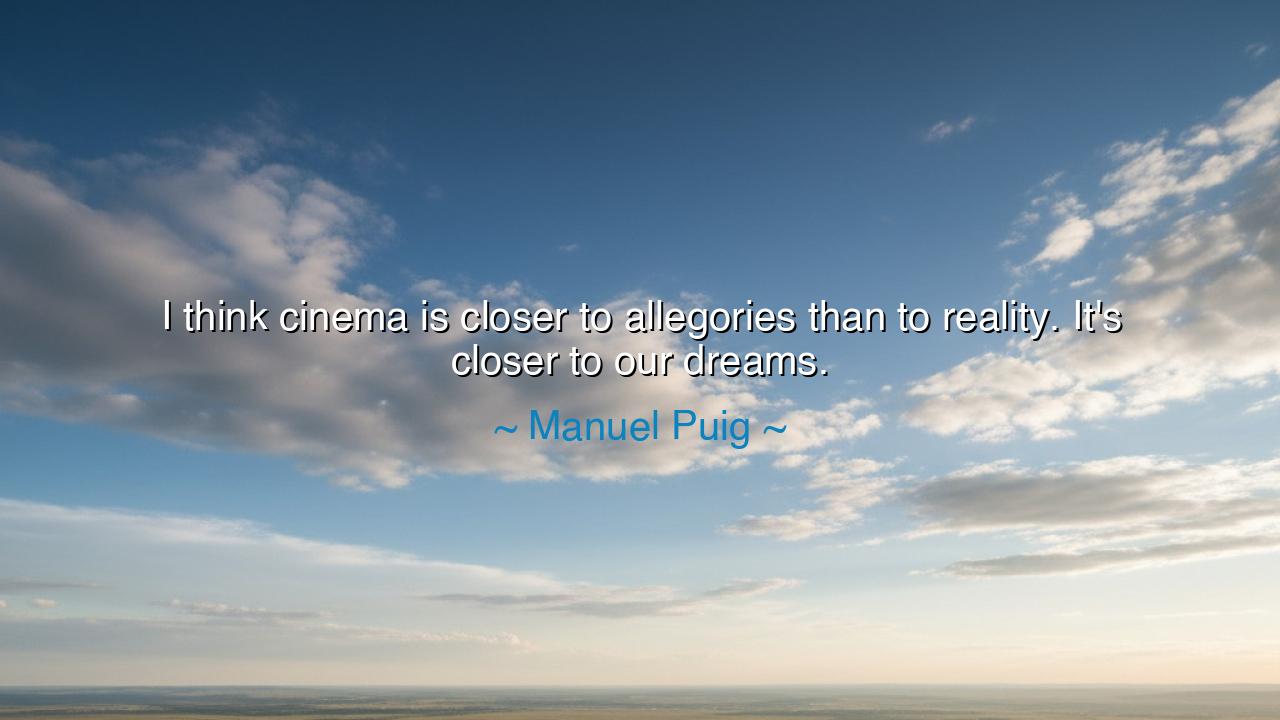
I think cinema is closer to allegories than to reality. It's






“I think cinema is closer to allegories than to reality. It’s closer to our dreams.” – Manuel Puig
Hear, O lover of art and imagination, the words of Manuel Puig, the Argentine novelist and screenwriter whose pen moved between shadow and light, weaving stories that blurred the borders between truth and illusion. In this reflection, he lifts the veil upon the nature of cinema, revealing that it does not merely mirror reality, but rather transforms it into allegory—a vision through which we glimpse the hidden language of our own dreams. His words are not an analysis but an invocation: a call to see film not as a record of the world as it is, but as a reflection of the soul as it longs to be.
When Puig declares that cinema is “closer to allegories than to reality,” he speaks as a philosopher of emotion. An allegory is a story that transcends the literal, a vessel for truth that cannot be told directly. Just as myth and fable once carried the wisdom of the ancients, so too does cinema carry the myths of our modern age. The screen does not merely show us the world—it reveals to us our inner landscape: our desires, our fears, our unspoken yearnings. When the lights dim and the story begins, we step not into the streets of the real, but into the corridors of symbol and meaning, where every image is a mirror and every sound an echo of something deeper.
In this sense, Puig reminds us that film is not an imitation of life, but a continuation of the oldest human ritual—the act of storytelling. Just as the bards of old sang the epics of gods and heroes, transforming history into legend, so do filmmakers transform the mundane into the mythic. Consider the great works of cinema—Kurosawa’s “Dreams,” Fellini’s “8½,” Tarkovsky’s “The Mirror,” or Bergman’s “The Seventh Seal.” None of these are bound to the realism of daily life, yet all of them feel truer than truth. They do not report—they reveal. They show us what lies beneath the skin of existence, in the realm where thought becomes image and longing becomes light.
Even the ancient Greeks understood this, though their stage was not lit by a projector, but by torches and stars. When Sophocles wrote of Oedipus, he was not chronicling a king’s tragedy—he was unveiling the eternal human condition: our blindness, our fate, our search for identity. Cinema, as Puig declares, walks the same path. It is not reality, but vision. The actors on screen are our archetypes, the worlds they inhabit are our collective dreams. To watch a film, then, is to participate in a sacred act of remembrance—to remember who we are beneath the masks of our daily roles.
And when Puig says that cinema is “closer to our dreams,” he speaks of its strange magic: its power to bridge the waking and the sleeping, the conscious and the unconscious. The flicker of the screen is like the flicker of the mind’s eye as we dream. In both, logic dissolves, time bends, emotion reigns supreme. What is cinema if not a shared dream—one dreamed together by strangers in the dark? It gives shape to what cannot be spoken and offers solace for what cannot be understood. Through it, we confront our buried selves: the child who yearns, the lover who regrets, the wanderer who seeks meaning in an indifferent world.
There is also a subtle warning in Puig’s wisdom: that we must not mistake the dream for the world itself. For as cinema enchants, it can also deceive. To live forever within its glow is to risk losing the touch of the real—to love only shadows and neglect the light. The dream must awaken us, not imprison us. True art sends us back to life renewed, with eyes open and hearts attuned to wonder. Thus, we must learn to walk between dream and day, letting each illuminate the other.
So, my child of vision and sound, take this lesson from Manuel Puig: cherish the allegory that lives within every story. When you watch a film, do not seek only entertainment—seek revelation. Ask yourself what truth it whispers to your soul, what part of your own dream it reflects. And when you return to your waking life, do not leave the dream behind—carry it with you, let it shape your compassion, your imagination, your courage to create. For cinema, as Puig knew, is not merely art—it is the continuation of humanity’s oldest dream, projected now upon a canvas of light.
And when you next stand beneath the darkened screen, remember this: reality is fleeting, but dreams are eternal. Through stories, we do not escape the world—we rediscover it. Through cinema, we do not lie—we see.






AAdministratorAdministrator
Welcome, honored guests. Please leave a comment, we will respond soon